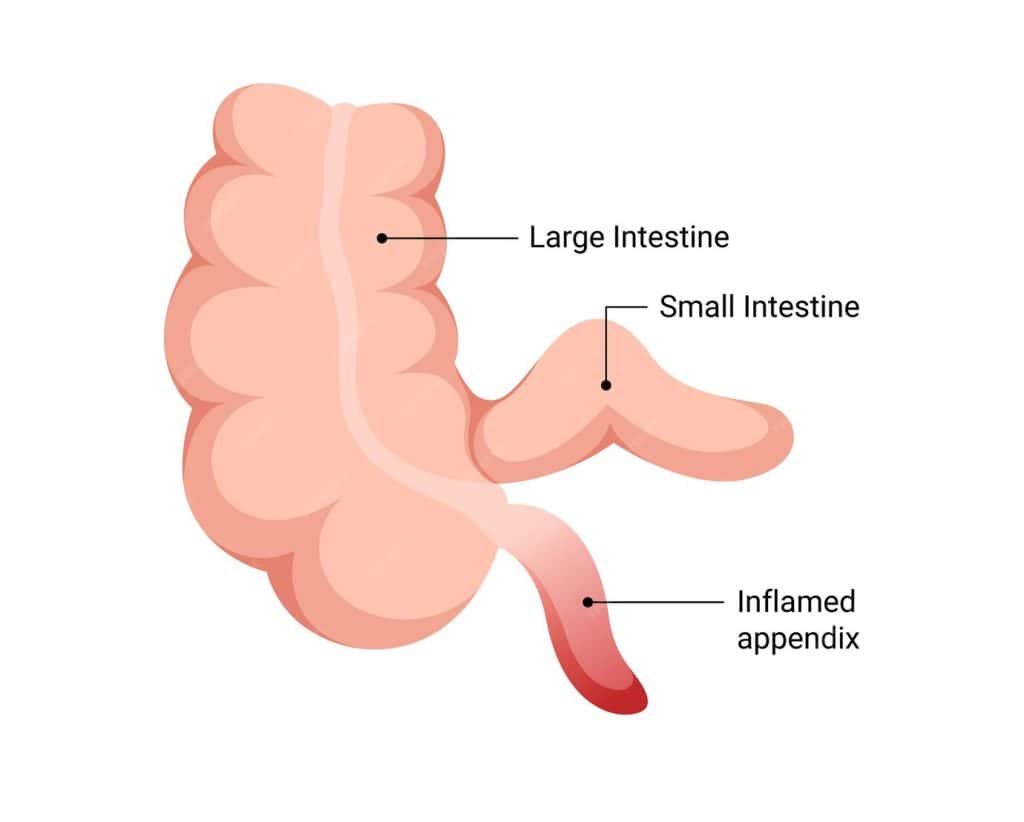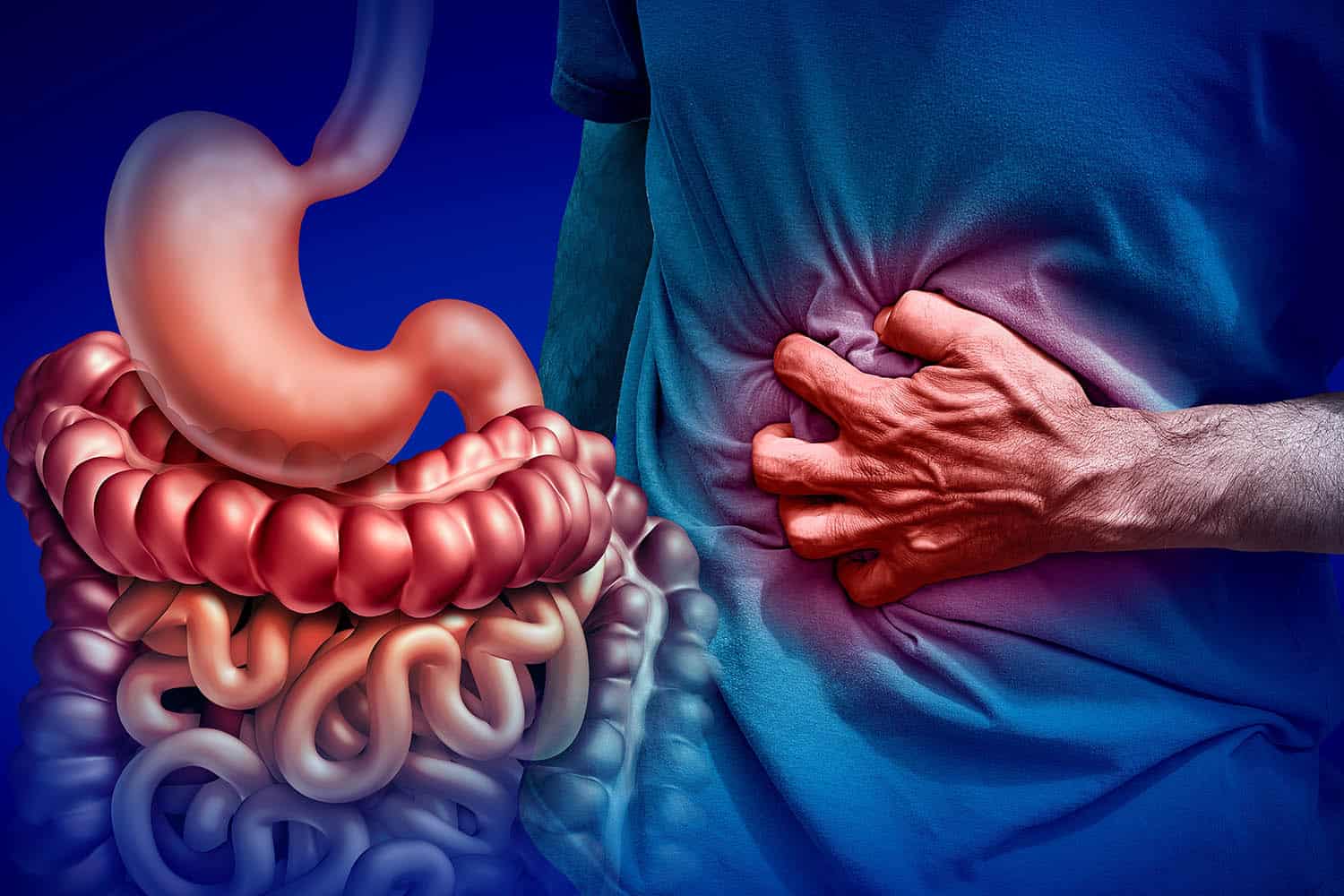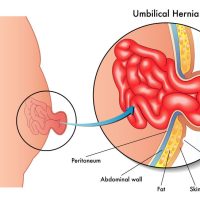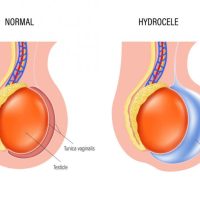Appendicitis, also known as an appendectomy, is an urgent surgical operation aimed at removing the appendix. Earlier diagnosis is critical to prevent rupture of Appendicitis in the later stages. Once diagnosed, it requires immediate medical attention and preferably surgical intervention through Appendicitis surgery.
The appendix is a 3 1/2 -inch long-tube-like organ that extends from the large intestine on the lower side of your stomach. It serves as a storage site for bile produced by the liver. In humans, it is considered a vestigial organ as it does not serve any vital function. While its specific functions remain unclear, the blockage of the Appendix leads to Appendicitis, a potentially life-threatening condition. The faecal matter moving through the intestine can cause infection or blockage in the Appendix, ultimately leading to its swelling and inflammation.


Symptoms
Time is a critical factor when it comes to Appendicitis. It may rupture within 36 hours of the initial symptoms. So keep a close watch on the symptoms and approach an Appendix specialist nearest you. Some prevalent indicators that assist in identifying appendicitis include:
- Stomach ache: Pain arises from the belly button and radiates towards the right side of the body.
- Pain intensifies with coughing or any jarring motions.
- Nausea/vomiting
- Loss of appetite
- Constipation or diarrhoea
- Low-grade fever
Less common symptoms
Besides the peculiar symptoms mentioned above, Appendicitis has less common symptoms that may include:
- Severe cramps
- Pelvic pain
- Pain during urination
- Pain under the rib cage
Diagnosis
Careful diagnosis of Appendicitis is important, as some of its symptoms might be mistaken for Kidney stones or other urinary tract infections. An Appendicitis specialist would consider a history of symptoms before examining the abdomen. The diagnostic procedures include the following:
Physical examination
During a physical examination, the doctor will check for signs of pain by applying gentle pressure to the abdominal area, which may cause discomfort. Upon releasing pressure, the pain will become worse.
Blood tests
Blood tests are often conducted to check for any signs of an infection or inflammation. If there is a rise in the count of white blood cells in our body, it confirms the infection. Through these examinations, the specialist assesses the nature of the infection.
Review of Medical History
It includes careful capture of information about the onset of abdominal pain, its progress, and associated symptoms such as nausea, vomiting, fever, and loss of appetite. The medical also reveals if the patient happens to suffer from any digestive or urinary tract-related infections.


Imaging techniques
If the symptoms and other tests suggest Appendicitis, then your Appendicitis specialist may ask you to opt for Imaging techniques like Ultrasound, Abdominal X-ray, and CT Scan or MRI to confirm the diagnosis. These techniques help assess the extent and scale of inflammation.
Types of Appendectomy
Appendicitis is divided into two types: Acute and Chronic.
Acute
- Occurs suddenly and worsens with time
- Requires prompt medical attention, which requires the removal of the appendix
- If not treated quickly, it can lead to inflammation and other potential complications
Chronic
- A rare condition that gradually develops over time
- Difficult to diagnose due to irregular symptoms
- Require Appendicitis surgery in case of severe symptoms or if they become acute
Appendicitis treatment
Medications
Pain relief medications are generally administered before and after appendicitis surgery. Before surgery, antibiotics are prescribed to prevent the onset of infection.
Appendectomy
The operation to remove the appendix is referred to as an appendectomy.. In this procedure, the appendix can be removed either by open surgery or laparoscopy.
Open surgery
It entails creating a large incision on the underside of the abdomen.. The Appendix is tied with the sutures and removed. If the Appendix bursts, the abdominal cavity will be cleaned with saline solution. Then, the surgeon applies sutures to close the cut portion. The hospital stay lasts for a week.
Laparoscopic Appendectomy
A minimally invasive procedure to remove the appendix. The doctor makes an incision measuring 2-4 inches and excises the appendix. After removal, the surgeon carefully applies dissolvable stitches to close the incision. The duration of the hospital stay is usually minimal, typically lasting about a day.
Potential Risks and Complications
If not addressed, appendicitis can result in severe complications. The most prominent one is the ruptured appendix, which is also known as Peritonitis (infection in the lining of the abdominal cavity). Some other potential complications of Appendicitis are as follows:
- Sepsis: This occurs when an infection enters the bloodstream, leading to a life-threatening state that damages organs and tissues.
- Abscess formation: A collection of pus formed around the appendix as a complication of acute appendicitis. This complication arises from a ruptured appendix coupled with a delayed diagnosis.
- Infertility in women: When the appendix ruptures, it causes inflammation in the pelvic area, leading to the formation of scars and adhesions. They block or damage the fallopian tubes, which are primarily responsible for transporting eggs from the ovaries to the uterus. Blocked fallopian tubes hamper fertilization, leading to infertility.
- Ruptured Appendix: Ruptured Appendix: When the appendix ruptures, it releases bacteria and other substances into the abdominal cavity.
Appendicitis operation cost
Similar to any major surgery, patients must consider the associated costs before opting for surgery. On average, the expenses for appendicitis surgery in Hyderabad range from Rs 25,000 to Rs 1,00,000. This again depends on a multitude of factors that impact the final.
FAQs
1)What are the long-term side effects of the Appendicitis operation?
- A) In the majority of cases, there are no side effects after an appendectomy. However, in rare cases, patients experience bowel obstructions.
2) What causes Appendicitis?
- A) Blockage of appendicitis, in particular due to faecal matter, tumors, or foreign bodies.
3) Can Appendicitis be prevented?
- A) No proper method is available out there to avert appendicitis. However, with nutritious diet and a healthy lifestyle may offer some help.
4) How long does it take to recover from Appendicitis surgery?
- The recovery time usually depends on the type of surgery.
- Laparoscopic surgery – 1-3 weeks
- Open surgery – 4-6 weeks
5) Is Appendicitis an emergency?
- A) Yes, it is an emergency, because if delayed, the appendix ruptures and causes peritonitis (severe infection.



